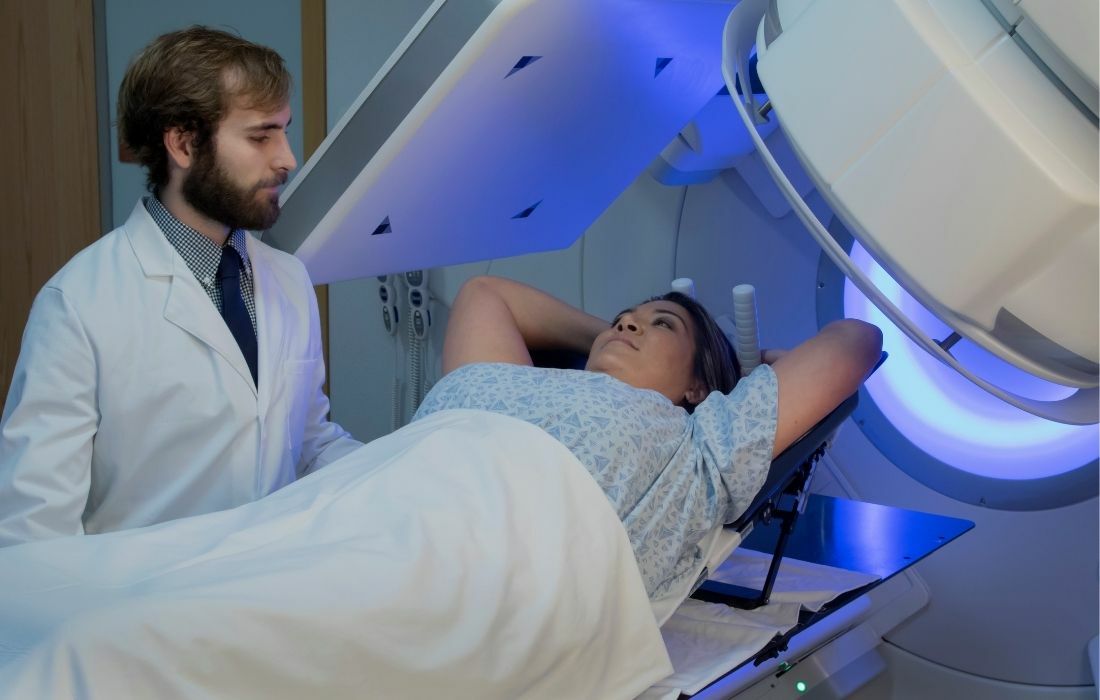August 23, 2021
Why Is Triple-Negative Breast Cancer So Hard to Treat?

Oncologists create a personalized breast cancer treatment plan for every patient based on the type of breast cancer, where it’s located in the breast(s), stage, grade, and hormone status. Each plays a role in the recommended treatments and the order they’re given. There is one type of invasive breast cancer that tends to be more challenging than others to treat. Triple-negative breast cancer does not use hormones or HER2 protein to fuel the cancer’s growth. However, this means the best set of treatments is more difficult to identify.
Types of Breast Cancer
Breast cancer is broadly classified into two types.
Non-invasive cancer – The cancer cells remain within their point of origin and have not spread to surrounding tissue. Non-invasive cancer is in a very early stage.
Invasive cancer - Invasive cancer, also called infiltrating cancer, has spread to the surrounding tissues.
Triple-negative breast cancer (TNBC) is considered an invasive breast cancer that grows faster than other types of breast cancer. Because of this, it’s important to begin TNBC treatment as soon as possible after diagnosis.
What is Negative in Triple-Negative Cancer?
When diagnosed, the pathologist will indicate if it is hormone-positive breast cancer, showing receptors for estrogen and/or progesterone on the cancer cells. Test results will also indicate if the tumor is HER2-positive, meaning there is an overgrowth of the HER2 protein, which fuels cancer growth.
The cancer cells in triple-negative breast cancers test negative for all three indicators. Patients are less likely to respond to hormone therapies that block estrogen and progesterone from reaching the cancer cells, and targeted therapies used to slow the growth of HER2 are not useful either. Other treatment options will be recommended for these patients.
Is Triple Negative Cancer Related to the BRCA gene mutation?
It’s estimated that approximately 70% of patients with a triple-negative breast cancer diagnosis also have the inherited BRCA gene mutation, particularly BRCA1. Because of this, most triple-negative breast cancer patients will be offered genetic testing to see if the BRCA mutation is present. If found, the oncologist will consider specific treatments that make breast cancer recurrence less likely.

What is the Recommended Treatment for Triple-Negative Breast Cancer?
Since hormone and targeted therapies aren’t as likely to be effective on triple-negative breast cancer, the oncologist will recommend other treatment options. Some of these treatments include surgery, chemotherapy, and radiation therapy. The order of the treatments will depend on how advanced the cancer is at the time of diagnosis. Some patients will have treatment before surgery, while others will start with surgery.
Breast Cancer Removal Surgery
Most women with breast cancer will have surgery to remove it. The oncologist and the breast cancer surgeon will review and discuss their best recommendation with the patient.
Lumpectomy - This surgery removes the tumor and a margin of tissue around it. It’s best for smaller cancers that have not spread throughout the breast. Also called breast-conserving surgery, patients keep most of the breast and sensation in the nipple. Radiation is likely to follow for these patients to be sure all the cancer cells in the area have been destroyed.
Mastectomy - This is the complete removal of the entire breast and possibly some of the chest wall muscles. It may be the preferred surgical treatment for triple-negative breast cancer patients since this type of cancer is more likely to recur. A plastic surgeon is often included in this process to reconstruct the breast if that is preferred. Radiation may still be recommended.

Chemotherapy for Triple-Negative Breast Cancer
Chemotherapy is considered the most common form of treatment for TNBC. It may be given before surgery, after surgery, or both. In some cases, chemo is combined with a targeted therapy called pembrolizumab to help reduce the tumor size. Research is showing that this produces better results that last longer than chemotherapy only after surgery to reduce the likelihood of breast cancer returning.
Targeted Therapies for Triple-Negative Breast Cancer
Patients with TNBC in stages one, two, or three who are also BRCA positive are likely to have targeted therapy added to the treatment plan because it has been proven to extend the patient’s lifespan.
Patients with Stage IV metastatic breast cancer will likely receive chemotherapy and a targeted therapy, also referred to as an antibody-drug conjugate. This targeted therapy attaches to a portion of the cell, making it easier for the chemotherapy to find and treat the cancer. Stage IV TNBC patients with the BRCA mutation may also receive PARP inhibitor targeted therapy drugs, making it harder for the damaged DNA to repair itself.
Immunotherapy for Triple-Negative Breast Cancer
About 1 in 5 triple-negative breast cancers have the PD-L1 protein. These patients will likely receive chemotherapy plus pembrolizumab, a type of immunotherapy. Immunotherapy is a rapidly expanding category of drugs that are showing promising results for patients with triple-negative breast cancer.
Radiation Therapy for Breast Cancer
Radiation directed at the areas where the breast cancer was removed is a common treatment after surgery. During surgery, the doctor does everything possible to remove all of the breast cancer. But there can be some cells left behind. Radiation therapy is administered over the course of several weeks after surgery to be sure any remaining cancer cells are destroyed. This is common for all types of breast cancer patients.

Extensive Clinical Research is Underway for Triple Negative Breast Cancer Treatments
The treatments currently available are the result of many years of clinical research with triple-negative breast cancer patients. More breast cancer clinical trials are underway to expand the treatment options for these patients.
If you have received a triple-negative breast cancer diagnosis, a clinical trial may be available to you right in our local area of Brevard County, Florida. Talk to a Cancer Care Centers of Brevard oncologist if you would be interested in participating in a trial.
Triple-Negative Breast Cancer Treatment in Brevard County, Florida
Cancer Care Centers of Brevard cares for triple-negative breast cancer patients every day with a comprehensive treatment plan customized for each person. Our medical oncologist, specializing in breast cancer, works with a radiation oncologist and breast cancer surgeon to create the best plan.
Our breast cancer specialists are here to help whether you have just been diagnosed or if your cancer has returned. We’re also available if you’d like a second opinion.
Request an appointment for a consultation. Our cancer clinics are located throughout Brevard County, Florida, including Melbourne, Merritt Island, Palm Bay, and Rockledge.
Originally published August 2021. Updated December 2024.
Categories: Breast Cancer